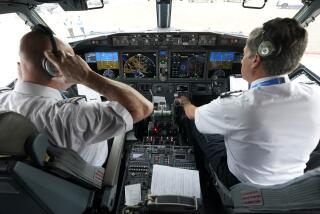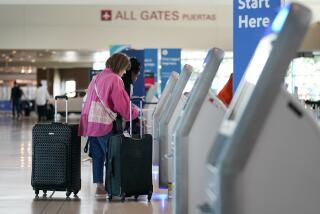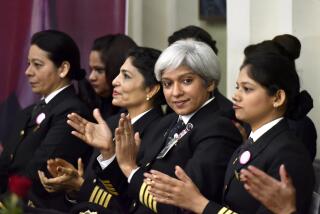Group Challenges Rule Forcing Pilots to Retire at Age 60
A group of commercial airline pilots, charging the Federal Aviation Administration with age discrimination, has formally requested permission to fly beyond the mandatory retirement age of 60.
The move, by 39 current and former pilots with seven major airlines, came this week in the form of an official petition to the FAA. It is the latest step in a long-simmering dispute between commercial pilots, who consider the age 60 rule to be outmoded, and the FAA, which defends it on the grounds of public safety.
âIf a guy is still able to do his job, and if heâs good at it, why should he get fired just because he has a birthday?â asked James R. LeBel, a 59-year-old Western Airlines captain who, under current rules, will be forced to give up his captainâs seat when he turns 60 on July 3.
Individual Ratings System Sought
âPeople just donât age as quickly as they used to, and I think the world has come to recognize that,â added the Sherman Oaks resident, who pilots a DC-10 between Los Angeles, Honolulu and Anchorage, Alaska.
Besides Western Airlines, the pilots who petitioned the FAA have worked for United, Trans World, Eastern, Delta, Alaska and Northwest. Their goal is to be judged by a system of individual ratings rather than face an all-inclusive age limit.
The FAA made no immediate response Thursday except to say that it needs the age cutoff because it canât predict which older pilots may experience sudden, incapacitating illnesses.
âWithout the ability to predict which individuals (will get sick), we have no choice but to say that nobody past 60 can continue to fly,â said Fred Farrar, an agency spokesman.
Federal law generally prohibits mandatory retirement earlier than age 70. Exceptions may be made if an employer proves that a certain degree of youthfulness is a genuine requirement for a job. Forced retirement has remained in place for many occupations involving public safety, although such policies are increasingly under fire.
There is no general age cutoff for non-commercial pilots.
Scientific Screening Tests
Past studies of the issue have given ammunition to both sides. As recently as 1981, the National Institute of Aging stopped short of recommending that the age 60 limit for commercial pilots be abolished. But the controversy is now spreading within the federal government as a growing number of scientists contend that diagnostic procedures are available to screen out unsafe older pilots.
Dr. T. Franklin Williams, a physician who is director of the National Institute of Aging, recently helped devise a system of scientific testing to screen out unsafe older pilots as a substitute for applying an age limit to everyone. But last month, FAA officials said Williamsâ approach fails to consider dementia, Parkinsonâs disease and other ailments associated with old age.
âThere arenât any medical grounds for an arbitrary retirement age for pilots or anybody else,â Williams said in a telephone interview Thursday.
The 39 pilots, aged 52 to 67, underwent a series of rigorous tests to assess their mental and physical preparedness to fly. They are presenting the results as evidence to the FAA.
âWith todayâs medical standards and knowledge, airline pilots can fly past 60 very easily,â maintained Charles Criswell, 67, a former Western Airlines pilot. After retiring as a captain seven years ago, Criswell sued Western and eventually won a Supreme Court decision allowing him to stay in the cockpit--where he works today as a lower-ranked flight engineer.
Despite the FAAâs professed willingness over the years to consider the issue objectively, the pilots contend that it has deliberately blocked reconsideration.
âThe FAA for years has disregarded medical advances, stonewalled the issue and blindly adhered to a rule that is outmoded,â said Raymond C. Fay, a Washington attorney representing the pilots.
As an example, Fay pointed to a report that the FAA commissioned from a former Air Force surgeon general in 1969. The attorney said the report found that the agency should evaluate pilots in terms of risk factors rather than age. The FAA never released the report, according to the pilotsâ petition.
Moving on Other Fronts
The pilots are further frustrated by the FAAâs willingness to reinstate reformed alcoholics or pilots who have battled emotional difficulties, heart disease and a wide range of other conditions--while the agency stands firm on mandatory retirement.
âTwenty-five years, ago there appeared a great weight of authority in favor of a chronological age limit,â Fay said. âNow the great weight of authority is shifting in the other direction.â
The pilots are moving on other fronts as well. Roger Thomas, attorney to House Aging Committee Chairman Edward Roybal (D-Los Angeles), said Thursday that if the FAA doesnât reconsider its position, Roybal probably will introduce legislation to abolish the age limit.
More to Read
Inside the business of entertainment
The Wide Shot brings you news, analysis and insights on everything from streaming wars to production â and what it all means for the future.
You may occasionally receive promotional content from the Los Angeles Times.










